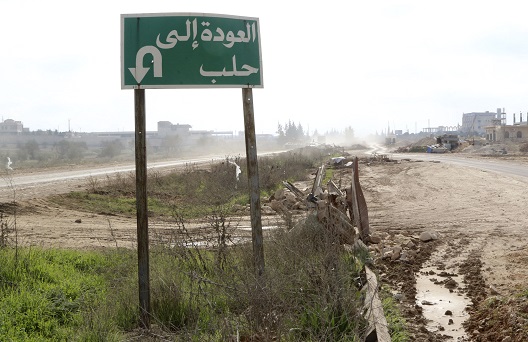 As usual, events in Aleppo portend more general crises in Syria. The recent outbreak of fighting southwest of Aleppo city is the most serious violation of the February 27 ‘cessation of hostilities’ (COH) yet, and further highlights the COH’s fundamental weaknesses and poor prospects. According to Syrian Observatory for Human Rights’ (SOHR) monitoring reports, the parties involved include the Levant Front (a broad rebel coalition), Syrian regime forces, pro-regime Shia militias, Russian air force, and the jihadist group the Nusra Front. Contested towns include Tallat al-Eis, Zitan, Khan Touman, and Zirba.
As usual, events in Aleppo portend more general crises in Syria. The recent outbreak of fighting southwest of Aleppo city is the most serious violation of the February 27 ‘cessation of hostilities’ (COH) yet, and further highlights the COH’s fundamental weaknesses and poor prospects. According to Syrian Observatory for Human Rights’ (SOHR) monitoring reports, the parties involved include the Levant Front (a broad rebel coalition), Syrian regime forces, pro-regime Shia militias, Russian air force, and the jihadist group the Nusra Front. Contested towns include Tallat al-Eis, Zitan, Khan Touman, and Zirba.
It is unclear who instigated the fighting (though opposition sources report it was a Nusra initiative), but all sides’ have good reason to covet this territory. These towns all fall along the M5 highway that connects Damascus and Aleppo and is arguably the most critical regime supply line. Once again, the balance of power in Syria is being decided not in negotiating rooms in Geneva, but on the ground.
For the Syrian regime the M5 highway has always been and remains a priority. It has violated the COH regularly anyway, so fighting over the M5 would not be a change in regime strategy. The opposition’s motives and timing are interesting however. The M5 has obvious military value, but the rebels may have also felt the need to demonstrate they can liberate regime-held terrain, and retaliate for the regime’s constant COH violations. At the same time, however, it is not in the armed opposition’s political-diplomatic interests to be seen as violating the COH. Its casts it as acting in bad faith, and indicates it cannot be trusted to respect the political positions of the high negotiation committee (HNC) that represents it in negotiations.
These contradictions and complications lend credence to claims that the Nusra Front played a large role in orchestrating this latest offensive, and would explain why the operation has been a largely local phenomenon. Nusra is not party to the COH, and the past few weeks of relative peace have decreased its military value to the Syrian opposition and population, placing it in an untenable position of fighting the regime and Russia without local allies. Nusra has much to gain by once again showing its military utility in southern Aleppo, and accelerating the COH’s slow decay. It tried and failed to retake parts of southern Aleppo in November. This time, by coordinating efforts with mainstream rebel groups in this strike, Nusra managed to retake some territory, if only temporarily. Regime forces along with allies are currently making efforts to re-take this territory. SOHR reports confirm continued clashes with missiles and rockets fired by both the regime and rebels. If Nusra can deliver or associate itself with lasting military gains, it can recover some of the synergy and standing with the rebels that it lost in the COH.
What is interesting is not why JAN would lead an offensive in Aleppo seeing as it has every reason to do so, but how it managed to rally other insurgent groups party who are party to the COH to support the attack. The fact is the opposition commitment to the COH rests on odd premises: as opposition sources have repeatedly told the authors, the rebels do not expect the regime to cease hostilities at all, but are interested in the diplomatic gains of participating in the COH and ending Russian air strikes. The escalation in southern Aleppo seems to indicate that a ceasefire with which one side is not even expected to comply leaves room for groups like Nusra to exploit it. In any case, Russian airstrikes have reportedly resumed in the area since the latest fighting began. If they persist, the COH will end in Aleppo, marking a complete break between the political process in Geneva and reality inside a key geography of the Syrian war. While peace talks will continue this week, the Aleppo clashes show that negotiations and realities on the ground are very different things.
Faysal Itani is a Resident Fellow with the Atlantic Council’s Rafik Hariri Center for the Middle East. Reema Hibrawi is an intern at the Rafik Hariri Center.
Image: Photo: A road sign that reads 'back to Aleppo' is seen at the main north-south highway linking Aleppo with Damascus, near the Wadi al-Deif military base that the rebel fighters took control of from forces loyal to Syria's President Bashar al-Assad earlier this month in Idlib province December 27, 2014. REUTERS/Mahmoud Hebbo
